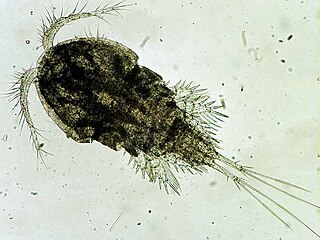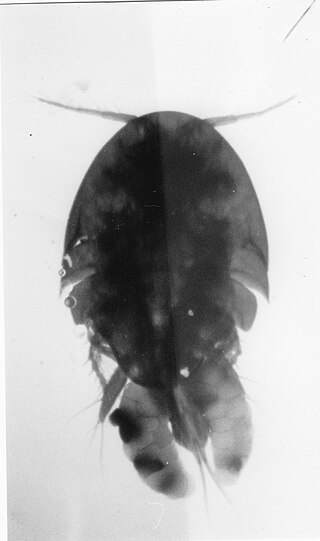
Tantulocarida is a highly specialised group of parasitic crustaceans that consists of about 33 species, treated as a class in superclass Multicrustacea. They are typically ectoparasites that infest copepods, isopods, tanaids, amphipods and ostracods.

The Cyclopoida are an order of small crustaceans from the subclass Copepoda. Like many other copepods, members of Cyclopoida are small, planktonic animals living both in the sea and in freshwater habitats. They are capable of rapid movement. Their larval development is metamorphic, and the embryos are carried in paired or single sacs attached to first abdominal somite.

Calanus is a genus of marine copepod in the family Calanidae. The genus was split in 1974, with some species being placed in a new genus, Neocalanus. The following species are recognised:
Idiodiaptomus gracilipes is a species of copepod in the family Diaptomidae. It is endemic to "a pool at Itapura", in São Paulo state, Brazil.
Paradiaptomus excellens is a species of copepod in the family Diaptomidae. It is endemic to South Africa.
Paradiaptomus simplex is a species of copepod in the family Diaptomidae. It is endemic to South Africa.
Paracyclopia is a genus of copepods in family Pseudocyclopiidae, containing only the species P. naessi. It is endemic to Bermudan karsts and is critically endangered.
Speleoithona is a genus of copepods in the family Speleoithonidae, containing the following species:
Speleophria bivexilla is a species of copepod in the family Speleophriidae. It is endemic to Bermuda.
Speleophria scottodicarloi is a species of crustacean in the family Speleophriidae. It is endemic to Chalk Cave, a collapsed cave in Smith's Parish, Bermuda, and it listed as critically endangered on the IUCN Red List. The pool it inhabits also contains Barbouria cubensis, Somersiella sterreri and Paracyclopia naessi.

The Cyclopidae are a family of copepods containing more than half of the 1,200 species in the order Cyclopoida in over 70 genera.
Paradiaptomus africanus is a species of copepod in the family Diaptomidae. As an example occurrence, Lovenula africana is found within the Makgadikgadi Pans, a seasonal hypersaline wetland in Botswana.
The Chitonophilidae are a family of parasitic copepods, with these genera:

Clausidiidae is a family of parasitic copepods of the suborder Poecilostomatoida, containing the following genera:
Centropagidae is a family of copepods. Its members are particularly known as plankton in coastal waters and in fresh water in Australia and southern South America. They are also found on subantarctic islands and in lakes in Antarctica.
Speleophriidae is a family of copepods, comprising seven genera. All are restricted to anchialine caves, with the exception of Archimisophria, which is found in the hyperbenthos of the depths of the Atlantic Ocean. The genera are:

Misophrioida is an order of copepods, containing the following families:
Nicothoidae is a family of copepods, containing the following genera:
Pseudocyclopiidae is a family of copepods, comprising the following genera:





